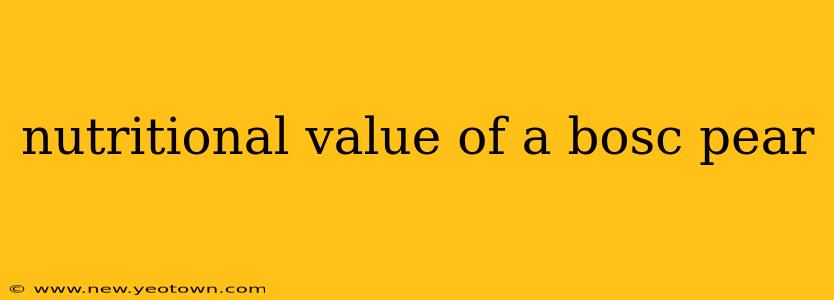The Sweet Story of the Bosc Pear: A Nutritional Powerhouse
The Bosc pear, with its distinctive brown skin and slightly gritty texture, isn't just a delicious treat; it's a nutritional powerhouse packed with vitamins, minerals, and fiber. Its unique flavor profile, ranging from subtly sweet to slightly spicy, has made it a beloved fruit enjoyed in countless ways – from simple snacking to elegant desserts. But beyond its delightful taste lies a wealth of health benefits often overlooked. Let's delve into the nutritional value of this humble yet remarkable fruit.
What are the main nutrients in a Bosc pear?
A medium-sized Bosc pear (about 178 grams) offers a surprisingly impressive nutritional profile. It's a good source of dietary fiber, vitamin C, and potassium. While the exact amounts can vary slightly depending on factors like growing conditions and ripeness, you can generally expect to find:
- Fiber: Crucial for digestive health, fiber helps regulate bowel movements and promotes satiety, aiding in weight management. Bosc pears are a good source of both soluble and insoluble fiber.
- Vitamin C: A potent antioxidant, vitamin C supports immune function and protects cells from damage caused by free radicals.
- Potassium: Essential for maintaining healthy blood pressure, potassium works in conjunction with other nutrients to regulate fluid balance in the body.
- Other Vitamins and Minerals: Bosc pears also contain smaller amounts of other essential vitamins and minerals like vitamin K, copper, and manganese. These contribute to various bodily functions, from blood clotting (vitamin K) to bone health (copper and manganese).
Are Bosc pears good for weight loss?
The high fiber content in Bosc pears plays a significant role in weight management. Fiber adds bulk to your diet, making you feel fuller for longer and reducing overall calorie intake. This feeling of satiety can be particularly helpful in curbing unhealthy cravings and preventing overeating. Furthermore, the relatively low calorie count of Bosc pears makes them a guilt-free addition to a weight-loss diet. Remember, however, that weight loss is a complex process that requires a holistic approach, including regular exercise and a balanced diet.
What are the health benefits of eating Bosc pears?
Beyond weight management, the nutrients found in Bosc pears contribute to a range of health benefits:
- Improved Digestion: The high fiber content promotes regular bowel movements and prevents constipation.
- Boosted Immunity: The vitamin C acts as a powerful antioxidant, strengthening your immune system and protecting against illness.
- Healthy Blood Pressure: The potassium content supports healthy blood pressure regulation.
- Reduced Risk of Chronic Diseases: The antioxidants in Bosc pears help protect against cell damage, potentially reducing the risk of chronic diseases like heart disease and certain cancers.
How many calories are in a Bosc pear?
A medium-sized Bosc pear typically contains around 100 calories. This relatively low calorie count, combined with its high fiber and nutrient content, makes it a healthy and satisfying snack or addition to a meal.
How can I incorporate more Bosc pears into my diet?
The versatility of the Bosc pear makes it easy to incorporate into your daily diet:
- Snacking: Enjoy a ripe Bosc pear on its own as a healthy and delicious snack.
- Salads: Add sliced Bosc pears to green salads for a touch of sweetness and contrasting texture.
- Smoothies: Blend Bosc pears into smoothies for a creamy texture and added nutrients.
- Desserts: Use Bosc pears in pies, crisps, cobblers, and other baked desserts.
- Sauces: Bosc pears can be cooked down into delicious sauces to accompany meats or poultry.
The Bosc pear, with its delightful taste and impressive nutritional profile, is a fruit deserving of a prominent place in a healthy diet. From boosting immunity to aiding digestion, its contribution to overall well-being is undeniable. So next time you're at the grocery store, pick up a few Bosc pears and discover the sweet taste of good health.

